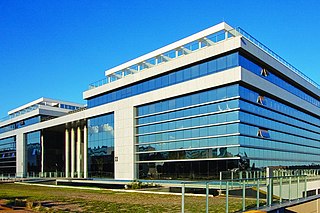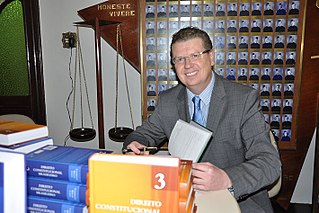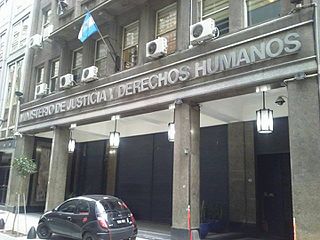This article may need to be rewritten to comply with Wikipedia's quality standards.(November 2020) |

The Ministry of Justice and Human Rights of Angola is judiciary arm of government that specializes on human rights in the nation of Angola.
This article may need to be rewritten to comply with Wikipedia's quality standards.(November 2020) |

The Ministry of Justice and Human Rights of Angola is judiciary arm of government that specializes on human rights in the nation of Angola.
The Ministry of Justice and Human Rights of Angola was established on November 12, 1975 by Law No. 1/75 after the country declared its independence. [1]
The Ministry of Justice and Human Rights of Angola has the following duties: [2] [3] [4] [5] [6]

The politics of São Tomé and Príncipe takes place in a framework of a unitary semi-presidential representative democratic republic, whereby the President of São Tomé and Príncipe is head of state and the Prime Minister of São Tomé and Príncipe is head of government, and of a multi-party system. Executive power is exercised by the President and the Government. Legislative power is vested in both the government and the National Assembly. The Judiciary is independent of the executive and the legislature. São Tomé has functioned under a multiparty system since 1990. Following the promulgation of a new constitution in 1990, São Tomé and Príncipe held multiparty elections for the first time since independence. Shortly after the constitution took effect, the National Assembly formally legalized opposition parties. Independent candidates also were permitted to participate in the January 1991 legislative elections.

Fernando José de França Dias Van-Dúnem was an Angolan politician who was the First Vice-President of the African Union's Pan-African Parliament. He was a member of the ruling Popular Movement for the Liberation of Angola (MPLA) and served as Prime Minister of Angola twice during the 1990s.

The judiciary of Portugal is a system of courts that together constitute one of the four organs of Sovereignty as defined by the Portuguese Constitution. The courts are independent from the other three Portuguese organs of Sovereignty.

The National Council of Justice (CNJ) is an administrative and oversight organ of the Brazilian Judiciary created by constitutional amendment in 2004 as a part of judicial reform. Among its responsibilities are ensuring that the judicial system remains autonomous, conducting disciplinary proceedings against members of the Judiciary, and compiling and publishing statistics on the Brazilian court system. The Council has nationwide jurisdiction over all courts except the Supreme Federal Court, but makes no rulings on cases and does not review judgements of other courts. Its fifteen members are chosen by the Supreme Federal Court for two-year terms.

The Ministry of Human Rights and Citizenship, formerly the Ministry of Woman, Family and Human Rights (2019–2022) and Secretariat for Human Rights of the Presidency of the Republic (1997–2015) is an office attached to the Presidency of Brazil. Its purpose is to implement, promote, and protect human rights, civic rights, and the rights of children, adolescents, women, families, the elderly, and the disabled.
The Ministry of External Relations is the Angolan government ministry which oversees the foreign relations of Angola. Tete António is the current foreign minister since 9 April 2020.

The Ministry of Finance is a cabinet-level ministry of the government of Angola. It traces it origin to 1976, and was created as a replacement for the Portuguese colonial-period Direcção dos Serviços de Fazenda e Contabilidade. The current Minister of Finance is Vera Daves.

The National Council for the Rights of Lesbian, Gay, Bisexual, Transvestite, Transsexual, Queer, Intersex, Asexual and Other People, formerly the National Council for Combating Discrimination and Promoting the Rights of Lesbians, Gays, Bisexuals, Transvestites and Transsexuals until 2018, is an executive council under the Ministry of Human Rights and Citizenship. The is located in Brasília, in the Federal District, in Brazil.

The Brazilian Election Justice was created by Decree No. 21,076 of 24 February 1932, representing one of the innovations of the Brazilian Revolution of 1930. In 1932 the first edited Brazilian election code was passed. It was inspired by the election justice of the Czech Republic and the ideas of Joaquim Francisco de Assis Brasil, a politician, farmer and ambassador.

The Ministry of Justice and Public Security, previously known as Ministry of Justice and Ministry of Justice and Citizenship, is a cabinet-level federal ministry in Brazil. The current minister is Ricardo Lewandowski.

Clèmerson Merlin Clève is a Brazilian jurist, Law school professor, and lawyer.

Silverio Pinto Baptista is the Provedor (Ombudsman) for Human Rights and Justice of Timor-Leste. He has held this position since October 2014. He is supported by the Office of the Provedor for Human Rights and Justice, or Provedoria dos Direitos Humanos e Justiça (PDHJ), which is the National Human Rights Institution of Timor-Leste.
Horacio de Almeida is Deputy Provedor of Human Rights in the Office of the Provedor for Human Rights and Justice, or Provedoria dos Direitos Humanos e Justiça (PDHJ), in Timor-Leste. He has held this position since January 2015.

The Ministry of Justice of Argentina is a ministry of the national executive power tasked with enforcing of the law and administration of justice.

The Ministry of Justice is the government department of East Timor accountable for the administration of justice.

The Ministry of National Defence and Homeland Veterans is an executive agency of the Government of Angola that controls the Angolan Armed Forces. It is based at Rua 17 de Setembro in Luanda.
The Office of theAttorney General of Angola primarily represents the state—particularly with criminal prosecutions. Additionally, the Attorney General of Angola defends the legality of judicial functions, monitor for procedural compliance in the court system, and defend the legal rights of individuals and corporations. By the Constitution of Angola, the office is given administrative and financial autonomy.
Edite Ramos da Costa Tenjua is a São Tomé and Príncipe lawyer and businesswoman who was minister of justice from 2012 to 2014, served on the country's Constitutional Court from 2019 to 2020. She has been minister of foreign affairs since September 2020.
Maria Lúcia Amaral is a Portuguese lawyer, university professor, politician and judge. She was vice-president of the Constitutional Court of Portugal and is Portugal's 10th Ombudsman, being the first woman to hold this post.
{{cite book}}: CS1 maint: multiple names: authors list (link)